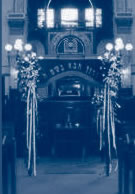|
SEDRA : TETZAVEH HERTZ CHUMASH P.339 Exodus
Ch. 27 verses 20.
This week's Sedra is generously sponsored by Danny Goldsmith.
SYNOPSIS:
The Sanctuary having been described the Torah now deals with
the requirements of those who are to serve in it.
Following a description of the Olive Oil for kindling the
Eternal Lamp (Menorah), Aaron and his sons are "drawn
near" to Minister in the Tabernacle. The "Holy Garments"
of Aaron as Kohen Gadol are to be made by "wise-hearted"
people.
The vestments include the Ephod - a close fitting coat of
the same fabric as the Parochet Curtain for the Holy of Holies.
Two onyx stones were sown into the shoulder straps with the
names of the twelve tribes inscribed on them.
A breastplate on which were 4 rows of precious stones inscribed
with the names of the Twelve Tribes constituting the Urim
and Tummim was made to hang over the Ephod.
The Ephod was worn over a blue robe with "pomegranate
shaped" balls interspersed with golden bells attached
to its hem. A Tzitz or plate of gold inscribed with the words
"Holy to the Lord" was made to be worn across Aaron's
forehead with a Mitre (headdress) to be placed on his head.
Simpler tunics were made for Aaron's sons.
A description is provided of the service and preparations
for consecrating Aaron and his sons to the priesthood. This
is followed by a brief introduction to the nature of the various
daily sacrifices. The Sedra concludes with the details of
construction and use of the Altar of Incense.
IN SOME YEARS THIS SEDRA COINCIDES WITH SHABBAT ZACHOR
A COMMENTARY FOR WHICH APPEARS BELOW:
SPECIAL MAPHTIR HERTZ CHUMASH p. 856 Deut. 25 verse 17.
The Special Maphtir of "Zachor" : "Remember
what Amalek did...." is the 2nd of the four special readings
for the Sabbaths preceding Pesach. It is always read on the
Shabbat before Purim.
Following the crossing of the Red Sea at the Exodus when the
entire world was in awe of G-d's Power and Might, the Amalekites
launched a cowardly attack on the Israelites. Hamman, the
persecutor of the Jews in later times, was a descendant of
Amalek.
THE HAPHTORAH HERTZ CHUMASH P. 995 I Samuel Ch. 15 The Haphtorah
relates to the theme of the Maphtir and describes King Saul's
campaign against the Amalekites.
TELL ME RABBI ..... PURIM
Purim, observed on 14th Adar, commemorates the saving of
the Jewish communities living under Persian rule from Haman's
evil designs to exterminate them. It seems the events described
in the book of Esther, took place about 450 B.C.E.
The name Purim derives from the word pur - lottery, the method
used by Haman to select the date for a general massacre of
the Jews. The sudden turn of events in the story of Purim
which turned the tables on the oppressor has provided a spark
of hope and encouragement to oppressed and victimised Jewish
communities throughout the centuries.
FOUR OBSERVANCES: The most prominent observance of
Purim is to listen to the reading of the Scroll of Esther
- the Megillah evening and morning.
Both men and women are required to listen to the reading of
the Megillah. Children should also be trained to attend the
Synagogue to fulfil this duty.
Purim observances are based on the following passages : "And
Mordechai wrote these things and sent letter to all the Jews...
to enjoin them that they should keep the fourteenth day of
the month of Adar as days of feasting and gladness, and of
sending portions one to another, and gifts to the poor. And
the Jews took upon themselves... and upon their descendants,
that they would keep these two days according to the writing
thereof and according to the appointed time, every year".
(Esther 9:20-23,27)
A Festive family dinner Seudah should be held on Purim day
fulfilling the directive that these be days of feasting (y'mai
mishteh). Each person should "send portions" consisting
of at least two items of food that may be readily eaten to
several friends. This is called in Hebrew "shalach manos"
or "mishloach manot".
Each person should give gifts (charity) to at least two poor
people or worthy causes. Even a poor person who is himself
a recipient of charity must give to others. "A person
is required to drink on Purim until he does not know the difference
between `cursed be Haman' and `blessed be Mordachai'"
(Megillah 75). However one should not vulgarise his behaviour.
Although there is no prohibition of work on Purim one should
nonetheless abstain from one's regular job on Purim day (if
possible) and celebrate the holiday in the appropriate manner.
The custom to hold parades, carnival-type celebrations and
parties on Purim and the wearing of costumes and similar merrymaking,
especially by the children, is a particularly
BACK TO SHABBAT SHALOM
TABLE
|








